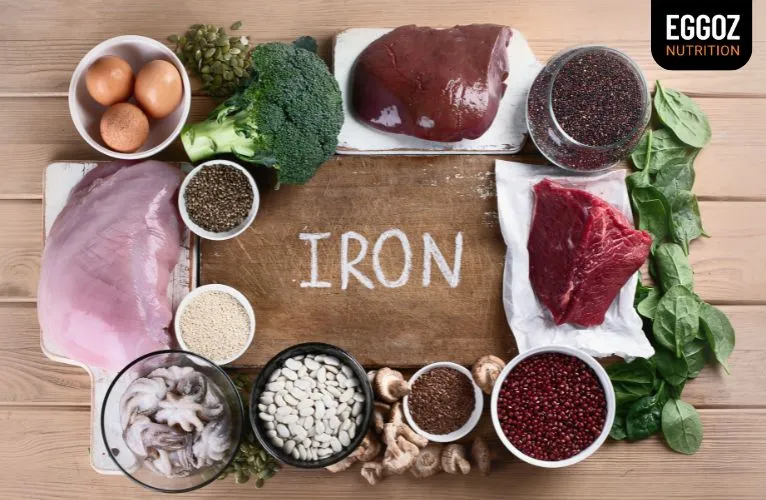Have you ever felt tired or noticed your skin looking dull than usual?
These could be more than just signs of a poor night’s sleep or a hectic week.
They might be your body’s way of telling you it’s lacking a crucial nutrient: iron.
This blog explores five iron rich foods that are pivotal in combating iron deficiency with their importance, exact iron nutrition they provide, and how they fit into an iron-rich meal plan.
Importance of Iron Rich Foods:
Iron is a cornerstone nutrient, essential for producing haemoglobin, a protein in red blood cells that carries oxygen from the lungs to all parts of the body. Iron rich foods are key to ensuring sufficient iron levels, particularly for populations at risk of deficiency, such as pregnant women, young children, and vegetarians. Moreover, adopting an iron-rich meal plan can lead to improved energy levels, better physical health, and enhanced mental performance, highlighting the key role of iron in maintaining a balanced and healthy lifestyle.
Recognising Iron Deficiency Symptoms:
Iron deficiency can lead to anaemia, characterised by symptoms such as:
- Weakness and Fatigue
- Dark circles under the eyes
- Shortness of breath
- Lightheadedness or Dizziness
- Cold hands and feet
Try These 5 Iron Rich Foods
1. Spinach: The Green Powerhouse with Food Importance
Spinach is of the major iron rich foods, known for its vitamins, minerals, and antioxidants. In salads, smoothies, and cooked foods, its adaptability makes it appealing.

Exact Iron Nutrition
A 100-gram portion of cooked spinach provides 2.7 milligrams of iron, much of the daily adult iron requirement.
Benefit of Food/Iron
Spinach’s iron helps prevent an iron shortage and boost vitality. Vitamin C boosts iron absorption, while antioxidants protect the eyes in spinach.
2. Legumes: Plant-Based Iron Source Food Importance
Legumes, which include beans, lentils, and chickpeas, are a critical part of a vegetarian or vegan diet, providing a significant source of plant-based iron.

Exact Iron Nutrition
One cup of cooked lentils provides about 6.6 mg of iron, making legumes an excellent choice for meeting your daily iron intake.
Benefit of Food/Iron
Beyond iron, legumes are a great source of fibre, protein, and antioxidants. They help in preventing iron deficiency symptoms and can improve digestive health.
3. Eggs: A Multipurpose Iron Source
Eggs are a kitchen staple around the world, known for their versatility and nutritional profile, including their content of iron in eggs.

Exact Iron Nutrition
One large egg contains about 0.4 mg of iron. While this might seem low, eggs are often consumed in multiple quantities and can significantly contribute to iron rich foods intake.
Benefit of Food/Iron
Eggs contain heme iron, which is more easily absorbed by the body. Including iron in eggs in your diet can help reduce iron deficiency symptoms and provide a range of other essential nutrients like protein and vitamin D.
4. Broccoli: A Nutrient-Dense Vegetable Food Importance
Broccoli is renowned for its health benefits, including its high vitamin C content, which enhances iron absorption, making it a key component of any Iron-rich meal plan.

Exact Iron Nutrition
One cup of cooked broccoli contains about 1 mg of iron. Combined with its high vitamin C content, broccoli is an excellent food for boosting iron levels.
Benefit of Food/Iron
The combination of iron and vitamin C in broccoli ensures that the iron is efficiently absorbed, helping to prevent iron deficiency symptoms and support immune function.
5. Pumpkin Seeds: A Snackable Iron Source Food Importance
Pumpkin seeds are a tasty and convenient snack that packs a nutritional punch, including a healthy dose of iron.

Exact Iron Nutrition
One ounce (about 28 grams) of pumpkin seeds contains about 2.5 mg of iron, contributing significantly to your daily iron intake.
Benefit of Food/Iron
Pumpkin seeds are also rich in antioxidants, magnesium, and zinc. Incorporating these seeds into your diet can help combat iron deficiency symptoms and support heart health.
Conclusion
Incorporating these five essential foods into your diet can significantly improve your iron intake, helping to prevent iron deficiency and its associated symptoms. From the iron in eggs to the abundant iron found in legumes, spinach, broccoli, and pumpkin seeds, each food offers a unique contribution to an iron-rich meal plan. By choosing Eggoz Nutrition Eggs, you’re not just enriching your diet with iron; you’re taking a proactive step towards a healthier, more energised life. Remember to include vitamin C-rich meals with non-heme iron sources to improve iron absorption. The correct iron-rich food plan will help you get the many advantages of adequate iron levels.

